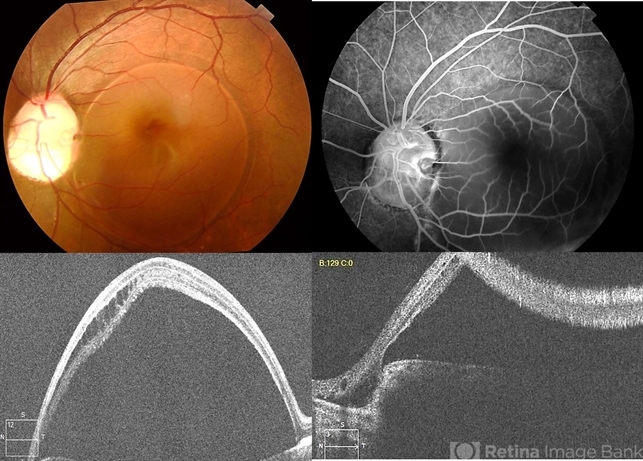-
 By Janani Sreenivasan, MBBS.,MS.,
By Janani Sreenivasan, MBBS.,MS.,
Sankara Nethralaya
Co-author(s): Dr Atul Dhawan, Dr Padma Preetha N - Uploaded on Jun 10, 2021.
- Last modified by Caroline Bozell on Jun 10, 2021.
- Rating
- Appears in
- Miscellaneous
- Condition/keywords
- optic disc pit, optic disc, macular detachment, hybrid anomaly, coloboma of optic disc
- Photographer
- Dr Janani Sreenivasan
- Imaging device
-
Optical coherence tomography system
Zeiss Cirrus HD-OCT - Description
- Optic disc pit is a rare anomaly of the optic nerve head that can be associated with maculopathy leading to progressive visual deterioration. It belongs to the spectrum of congenital cavitary anomalies of the optic disc which encompasses extrapapillary cavitation, optic disc coloboma, and morning glory. Very rarely, optic disc pits are seen in combination with optic disc colobomas. Histopathologically, disc pit is defined as herniation of dysplastic retinal tissue into an excavation, rich in collagen, which can stretch into the subarachnoid space via a defect in the lamina cribrosa. Interestingly, this structural abnormality leading to a non-physiological communication between the intraocular and extraocular spaces is a common feature among all the congenital cavitary disc anomalies. Optic disc pit maculopathy is characterized by intraretinal and subretinal fluid at the area of macula. The origin of the retinal fluid remains unclear. Possible sources include the vitreous cavity, the subarachnoid space and the orbital space surrounding the dura. It has been estimated that approximately 25% to 75% of patients will develop serous detachment and/or retinoschisis of the central macula at some stage of their life. On fundus examination, ODPs typically appear as single grayish, round or oval depressions at the optic disc. Most commonly, they are detected at the inferotemporal segment of the disc, but may also be observed elsewhere, including the central area.The coexisting macular detachment can be related to lamellar or full-thickness macular holes, cystoid changes, retinal pigment epithelium atrophy and eventually to irreversible loss of vision,especially in longstanding cases. Herewith, we present a 32-years-old male patient presenting with an unusual combination of optic disc pit with maculopathy and optic disc coloboma (hybrid anomaly) in the same eye with corrected visual acuity of 3/60.


 Initializing download.
Initializing download.










